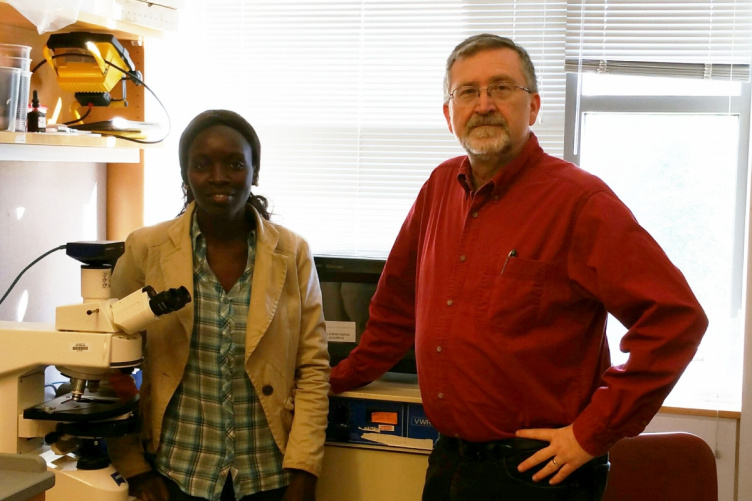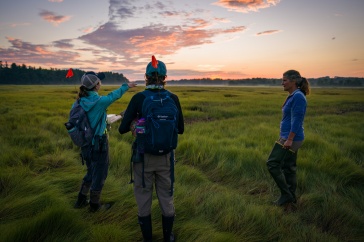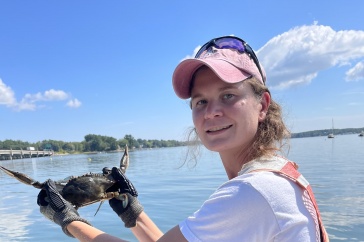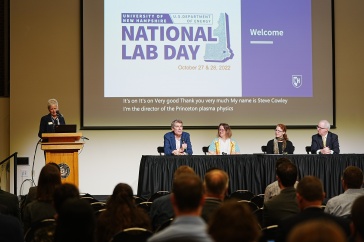
Researcher Nathalie Diagne of Senegal joined researcher and professor Lou Tisa’s lab for three months after being named a 2015 Borlaug Fellow.
Salt left behind from ocean spray is so concentrated on land in parts of Africa that one can see salt crystals in the soil sparkling in the sun. For farmers in these areas, the increased salinization of prime agricultural land is having a detrimental impact.
This spring, Louis S. Tisa, a researcher with the NH Agricultural Experiment Station and professor of molecular, cellular and biomedical sciences in the College of Life Sciences and Agriculture, welcomed an international scholar who is working to find solutions to the issue.
Nathalie Diagne of Senegal joined Tisa’s lab for three months after being named a 2015 Borlaug Fellow. The Norman E. Borlaug International Agricultural Science and Technology Fellowship Program promotes food security and economic growth by providing training and collaborative research opportunities to fellows from developing and middle-income countries.The Borlaug Fellowship Program honors the American agronomist, humanitarian and Nobel laureate who is known as the “father of the Green Revolution.” Borlaug fellows are generally scientists, researchers or policymakers who are in the early or middle stages of their careers. Since the program’s inception in 2004, approximately 700 fellows from 64 countries have participated in research and training focused on a wide array of agriculture-related topics, including agronomy, veterinary science, nutrition, food safety, sanitary and phytosanitary issues, natural resource management, agricultural biotechnology, global climate change, agricultural economics and agricultural policy.
"This is an opportunity for me to build an international collaboration as well as utilize facilities that we do not have..."
Diagne is a researcher with the Senegalese Institute for Agricultural Research. She received her doctorate in plant biology from Cheikh Anta Diop University, Senegal. While at UNH, Diagne is working on the issue of salinization of soil in Senegal and use of acacia trees, which is a new area of research for Tisa.
“It is a big issue in Senegal. It affects agricultural productivity. We are looking for the better salt tolerant combination acacia tree, nitrogen fixing bacteria, and arbuscular mycorrhizal fungi that can be used for the rehabilitation of these kinds of lands this so that it can be better used for agriculture,” Diagne says.
She explains that in Senegal rising seas and sea spary are "main causes of lands salinization. It is worsening by climate change with the lack of rain and an increase of temperatures that furthering salt crystallization in the soil."

While at UNH, Diagne is working on the issue of salinization of soil in Africa.
During her fellowship, Diagne is sequencing the genomes of rhizobia that are resistant to salt. “This is an opportunity for me to build an international collaboration as well as utilize facilities that we do not have at the National Centre for Agronomical Research in Senegal,” Diagne says.
Diagne is one of many international researchers that Tisa has hosted during the years.
“I like collaborating with international groups. We have an opportunity to work together on important global problems. I also like the exchange they bring to our UNH student because it expands and enriches their education,” Tisa says.
This material is based upon work supported by the NH Agricultural Experiment Station, through joint funding of the National Institute of Food and Agriculture, U.S. Department of Agriculture, under award number 1006507, and the state of New Hampshire.
Learn more about the NH Agricultural Experiment Station.
-
Written By:
Lori Tyler Gula, PhD | NH Agricultural Experiment Station | lori.gula@unh.edu | 603-862-1452



















































